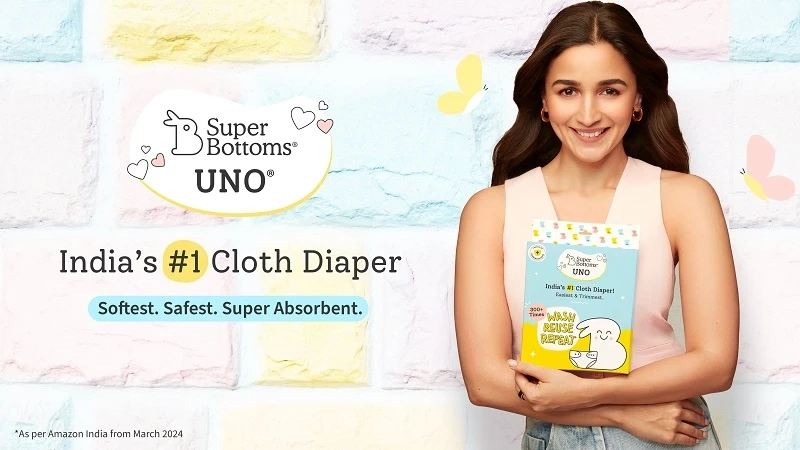Delicate and prone to irritation, the skin of newborns and infants is particularly susceptible to a range of sensitivities and reactions. From eczema and allergies to diaper rash and general discomfort, many babies struggle with skin-related issues that can cause considerable distress for both the child and the parents. Ensuring the gentle care and protection of a baby's sensitive skin is a top priority for parents. Traditional disposable diapers, chemical additives, fragrances, and synthetic materials can often exacerbate these skin problems, increasing discomfort and potential long-term health concerns.
Many parents face these challenges and turn to cloth diapers as a viable and natural alternative. With their breathable fabrics, chemical-free compositions, and customisable fit, reusable cloth diapers offer a more skin-friendly solution that effectively addresses the unique needs of babies with sensitive skin. By exploring the advantages of reusable cloth diapers for sensitive skin, parents can empower themselves to provide gentle, soothing care for their little ones, promoting overall comfort, health, and well-being throughout the diapering journey.
Understanding Skin Sensitivity in Babies
Tender and delicate, a baby's skin is often prone to sensitivity and irritation, requiring specialized care and attention. From eczema and allergies to diaper rash and general discomfort, various skin-related issues can plague infants, causing considerable distress for the child and the parents. Understanding the common causes of these skin sensitivities and the impact of traditional diapering options is crucial in determining the best approach to gentle and effective care.
Common Causes of Skin Irritation and Rashes:Allergic reactions to chemicals, fragrances, and synthetic materialsBacterial or fungal infections that can lead to inflammation and rednessIrritation from moisture, friction, and prolonged contact with waste productsUnderlying skin conditions like eczema, seborrheic dermatitis, or atopic dermatitis
By addressing the unique needs of babies with sensitive skin, parents can embark on a journey of gentle, effective, and eco-friendly diapering, ensuring the comfort and well-being of their little ones.
Advantages of Cloth Diaper for Sensitive Skin
Breathable and Chemical-Free Materials:Natural fibre fabrics, such as cotton, bamboo, and hemp, that allow for better air circulationAbsence of synthetic materials, dyes, and other potentially irritating chemicalsHypoallergenic and gentle on delicate baby skin, reducing the risk of reactionsThe Right Cloth Diaper for Sensitive Skin
When it comes to caring for babies with sensitive skin, the choice of reusable diapers is crucial. Opting for diapers made with natural, hypoallergenic fabrics can significantly provide gentle, soothing protection.
Fabric Choices: Natural Fibers like Cotton, Hemp, and BambooCotton is a renowned natural fibre that is soft, breathable, and gentle on delicate skin. SuperBottoms Freesize UNO, for example, is made with high-quality organic cotton free from harsh chemicals and irritants.Hemp is another excellent option. It is highly absorbent, antibacterial, and hypoallergenic, making it ideal for sensitive skin. Many cloth diaper brands, including SuperBottoms Freesize UNO, incorporate hemp into their diaper designs.Bamboo is a fast-growing, sustainable fabric that is exceptionally soft, moisture-wicking, and gentle on the skin. The SuperBottoms Freesize UNO features a Cotton inner lining, providing a soothing and comfortable experience for babies with sensitivities.
By carefully selecting baby cloth diapers made with natural, hypoallergenic fabrics and prioritizing gentle care, parents can provide a soothing and protective experience for their little ones with sensitive skin.
Caring for Baby Cloth Diapers Keeping Sensitive Skin in Mind
Proper care and maintenance of cloth diapers are crucial to ensuring they remain gentle and effective for babies with sensitive skin. By adopting gentle washing and drying techniques, using mild and fragrance-free detergents, and employing proper storage methods, parents can extend the lifespan of their cloth diapers while preserving their softness and effectiveness.
Gentle Washing and Drying TechniquesOpt for a gentle, cold-water wash cycle to avoid agitating the delicate fabric and fibres.Avoid using hot water, as it can break down the natural materials and compromise their softness.Steer clear of harsh bleaching agents or fabric softeners, as these can leave behind irritating residues.Dry cloth diapers on a low heat setting or line-dry them in the sun to preserve their softness and integrity.Key Takeaways
The delicate skin of babies is prone to sensitivities and irritation, but traditional disposable diapers can exacerbate these issues.Cloth diapers provide a natural, skin-friendly alternative, empowering parents to offer gentle care for their little ones.Carefully selecting and properly caring for cloth diapers ensures ongoing comfort and protection for babies with sensitive skin.FAQs
Q1 - Are there any special considerations for caring for cloth diapers for babies with eczema or other skin conditions?
Ans: Yes, extra care may be needed, such as avoiding fabric softeners, using sensitive-skin-friendly detergents, and monitoring for irritation or reactions. By addressing the unique needs of babies with delicate skin, parents can confidently choose and care for cloth diapers to provide a comfortable, gentle, and skin-nourishing diapering experience.
Q2 - How can traditional disposable diapers impact a baby's sensitive skin?
Ans: Disposable diapers often contain synthetic materials, fragrances, and other additives that irritate a baby's skin, leading to increased discomfort, redness, and rashes.
Q3 - What are the proper care and maintenance techniques for cloth diapers to preserve skin-friendly benefits?
Ans: Use gentle, fragrance-free detergents, avoid hot water and harsh chemicals, and store the diapers properly to maintain their softness and effectiveness for sensitive skin.


